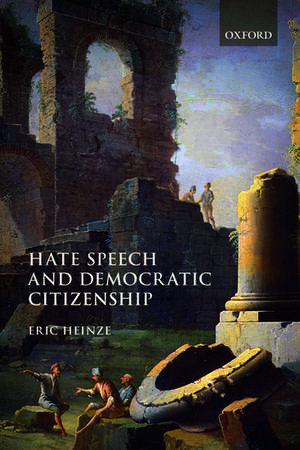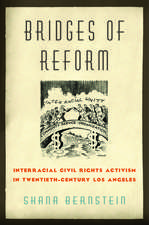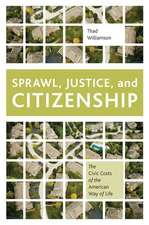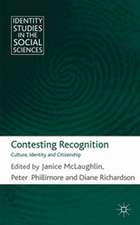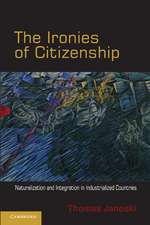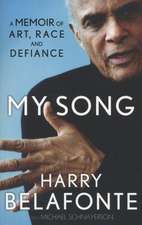Hate Speech and Democratic Citizenship
Autor Eric Heinzeen Limba Engleză Paperback – 18 oct 2017
| Toate formatele și edițiile | Preț | Express |
|---|---|---|
| Paperback (1) | 266.93 lei 31-37 zile | |
| OUP OXFORD – 18 oct 2017 | 266.93 lei 31-37 zile | |
| Hardback (1) | 628.53 lei 31-37 zile | |
| OUP OXFORD – 3 feb 2016 | 628.53 lei 31-37 zile |
Preț: 266.93 lei
Preț vechi: 280.89 lei
-5% Nou
Puncte Express: 400
Preț estimativ în valută:
51.08€ • 55.47$ • 42.91£
51.08€ • 55.47$ • 42.91£
Carte tipărită la comandă
Livrare economică 11-17 aprilie
Preluare comenzi: 021 569.72.76
Specificații
ISBN-13: 9780198816416
ISBN-10: 0198816413
Pagini: 250
Dimensiuni: 156 x 230 x 14 mm
Greutate: 0.42 kg
Editura: OUP OXFORD
Colecția OUP Oxford
Locul publicării:Oxford, United Kingdom
ISBN-10: 0198816413
Pagini: 250
Dimensiuni: 156 x 230 x 14 mm
Greutate: 0.42 kg
Editura: OUP OXFORD
Colecția OUP Oxford
Locul publicării:Oxford, United Kingdom
Recenzii
At the ACLU we have always believed that a legitimate political system requires the greatest possible vigilance toward restrictions on free speech. Our duty has been to defend freedom for speech we find abhorrent and even potentially dangerous. Heinze integrates that same commitment to public discussion into an all-encompassing vision of democratic law, politics and society.
Well-written and demonstrates an outstanding mastery of the existing literature on hate speech in legal and political theory. The book will be especially of interest to legal and political theorists, philosophers and political scientists, and will be accessible to both specialist and non-specialist readers. Most importantly, it will constitute a new important and original addition to the debate on hate speech and offer powerful counterarguments to the growing body of literature, led by Waldron and others, that defends hate speech laws.
Professor Heinzes book and his inspirational and at the same time thought-provoking ideas, razor-sharp observations and powerful arguments, contribute significantly to further enlivening the discourse on freedom of expression.
In his new book, Hate Speech and Democratic Citizenship, Eric Heinze, Professor of Law and Humanities at Queen Mary University of London, says the more a country is a genuinely developed democracy, the less it needs to impose 'speech bans'. He argues that developed democracies have better ways of combating violence and discrimination against vulnerable groups than by censoring speakers.
Heinze has written a rigorous, stimulating and provocative challenge to all those who advocate hate speech bans in longstanding, stable, prosperous democracies. Essential reading for anyone interested in the subject.
Advancing an original and sophisticated challenge to hate speech bans that does not fall back on libertarian, marketplace of ideas, or Americanised notions of free expression, Heinze has constructed a compelling challenge to hate speech bans that draws out the vital connection between public discourse and democratic citizenship. Hate Speech and Democratic Citizenship will absorb, inform and provoke.
Just when it seemed that there was not much more that could be usefully added to the long-running debate about the propriety of hate speech bans in democratic societies, Heinze offers new insights and fresh perspectives. Meticulously and fairly engaging the host of arguments in favor of such bans, this comprehensive and erudite work makes a powerful case that such prohibitions are inappropriate in longstanding, stable and prosperous democracies.
Its undeniable merit stems from Heinzes combination of masterly oversight of the current positions and the offer of a rare commodity today: a novel theory of free speech that deserves full attention. I will turn to it for years to come.
Heinze issues several challenges. To liberal political philosophy, which conceives freedom solely in terms of individual rights. To human rights lawyers and judges, who balance an individuals right to speech against the rights of others. And to the reader, who will grapple with Heinzes newly-coined and razor-sharp idioms. By treating free expression within public discourse as an attribute of democracy and citizenship, Heinze has thrown down the gauntlet to a whole range of legal and political actors who approach the same questions from more conventional liberal-legal premises. This ground-breaking book ought to be essential reading for legal philosophers, constitutional scholars, human rights lawyers, democracy theorists, and free speech campaigners.
Heinze offers a provocative, eloquent and scholarly challenge to those who would ban hate speech from the realm of democratic public discourse. He grounds his opposition to such bans in longstanding, stable and prosperous democracies not in the familiar but (he argues) inadequate foundations of individual rights, but in what he takes to be the constitutive requirements of democracy itself. The book thus makes a distinctive contribution not only to the ongoing debates about hate speech, but to democratic theory.
...This is a significant volume in the hate speech literature. It offers a powerful counter-point to recent works advocating hate speech bans, most notably that of Jeremy Waldron. It will definitely be of interest to anyone working in the political or legal philosophy of freedom of expression... Beyond the immediate academic audience, this is still an important work. It should be accessible enough to readers who are used to academic texts, and it presents a lot of the legal background to the issue clearly. The book's major strength is in presenting a defence of freedom of expression that is firmly rooted in the important, though abstract, discussion of rights and citizenship, but at the same time gives proper credence to real-world factors that shape legal regimes. It contributes not only an important critique of some prominent positions on freedom of expression, but also a distinct methodological approach to the problem.
This book provides the most in-depth and comprehensive explication of the democratic argument in favour of the robust protection of freedom of speech that I have read. It is erudite, and demonstrates the author's broad familiarity with an incredibly wide range of literature.
Eric Heinzeâs beautifully written book is an important and original contribution to the scholarly literatureâ [readersâ] knowledge and understanding of both the critical importance of hate speech and of the constitutive elements of democracy will be significantly enhanced.
Well-written and demonstrates an outstanding mastery of the existing literature on hate speech in legal and political theory. The book will be especially of interest to legal and political theorists, philosophers and political scientists, and will be accessible to both specialist and non-specialist readers. Most importantly, it will constitute a new important and original addition to the debate on hate speech and offer powerful counterarguments to the growing body of literature, led by Waldron and others, that defends hate speech laws.
Professor Heinzes book and his inspirational and at the same time thought-provoking ideas, razor-sharp observations and powerful arguments, contribute significantly to further enlivening the discourse on freedom of expression.
In his new book, Hate Speech and Democratic Citizenship, Eric Heinze, Professor of Law and Humanities at Queen Mary University of London, says the more a country is a genuinely developed democracy, the less it needs to impose 'speech bans'. He argues that developed democracies have better ways of combating violence and discrimination against vulnerable groups than by censoring speakers.
Heinze has written a rigorous, stimulating and provocative challenge to all those who advocate hate speech bans in longstanding, stable, prosperous democracies. Essential reading for anyone interested in the subject.
Advancing an original and sophisticated challenge to hate speech bans that does not fall back on libertarian, marketplace of ideas, or Americanised notions of free expression, Heinze has constructed a compelling challenge to hate speech bans that draws out the vital connection between public discourse and democratic citizenship. Hate Speech and Democratic Citizenship will absorb, inform and provoke.
Just when it seemed that there was not much more that could be usefully added to the long-running debate about the propriety of hate speech bans in democratic societies, Heinze offers new insights and fresh perspectives. Meticulously and fairly engaging the host of arguments in favor of such bans, this comprehensive and erudite work makes a powerful case that such prohibitions are inappropriate in longstanding, stable and prosperous democracies.
Its undeniable merit stems from Heinzes combination of masterly oversight of the current positions and the offer of a rare commodity today: a novel theory of free speech that deserves full attention. I will turn to it for years to come.
Heinze issues several challenges. To liberal political philosophy, which conceives freedom solely in terms of individual rights. To human rights lawyers and judges, who balance an individuals right to speech against the rights of others. And to the reader, who will grapple with Heinzes newly-coined and razor-sharp idioms. By treating free expression within public discourse as an attribute of democracy and citizenship, Heinze has thrown down the gauntlet to a whole range of legal and political actors who approach the same questions from more conventional liberal-legal premises. This ground-breaking book ought to be essential reading for legal philosophers, constitutional scholars, human rights lawyers, democracy theorists, and free speech campaigners.
Heinze offers a provocative, eloquent and scholarly challenge to those who would ban hate speech from the realm of democratic public discourse. He grounds his opposition to such bans in longstanding, stable and prosperous democracies not in the familiar but (he argues) inadequate foundations of individual rights, but in what he takes to be the constitutive requirements of democracy itself. The book thus makes a distinctive contribution not only to the ongoing debates about hate speech, but to democratic theory.
...This is a significant volume in the hate speech literature. It offers a powerful counter-point to recent works advocating hate speech bans, most notably that of Jeremy Waldron. It will definitely be of interest to anyone working in the political or legal philosophy of freedom of expression... Beyond the immediate academic audience, this is still an important work. It should be accessible enough to readers who are used to academic texts, and it presents a lot of the legal background to the issue clearly. The book's major strength is in presenting a defence of freedom of expression that is firmly rooted in the important, though abstract, discussion of rights and citizenship, but at the same time gives proper credence to real-world factors that shape legal regimes. It contributes not only an important critique of some prominent positions on freedom of expression, but also a distinct methodological approach to the problem.
This book provides the most in-depth and comprehensive explication of the democratic argument in favour of the robust protection of freedom of speech that I have read. It is erudite, and demonstrates the author's broad familiarity with an incredibly wide range of literature.
Eric Heinzeâs beautifully written book is an important and original contribution to the scholarly literatureâ [readersâ] knowledge and understanding of both the critical importance of hate speech and of the constitutive elements of democracy will be significantly enhanced.
Notă biografică
Eric Heinze (Maîtrise, Paris; JD, Harvard; PhD Leiden), a former Fulbright, DAAD and Chateaubriand fellow, is Professor of Law and Humanities at Queen Mary, University London. He has worked with the International Commission of Jurists and the UN Sub-Commission on Human Rights, and on private litigation before the United Nations Administrative Tribunal in New York. He is a member of the Bars of New York and Massachusetts, and has advised NGOs on human rights, including Liberty, Amnesty International and the Media Diversity Institute.
